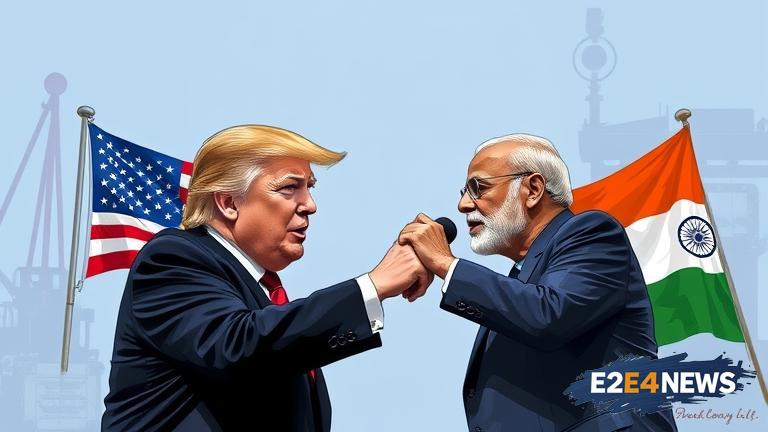The United States and India are on the brink of a trade war, with US President Donald Trump threatening to hike tariffs on Indian goods within the next 24 hours. This move is seen as a major escalation of trade tensions between the two nations, which have been simmering for months. The US has been pressuring India to open up its markets and reduce tariffs on American goods, but India has been resistant to these demands. Trump has been critical of India’s trade practices, accusing the country of being a ‘tariff king’ and imposing high tariffs on US goods. The US has already imposed tariffs on Indian steel and aluminum, and has also withdrawn India’s preferential trade status under the Generalized System of Preferences (GSP) program. India has retaliated by imposing tariffs on US goods such as almonds and apples. The trade tensions between the two nations have been escalating rapidly, with both sides imposing tariffs and counter-tariffs on each other’s goods. The US is India’s largest trading partner, and India is the US’s ninth-largest trading partner. The trade war between the two nations could have significant implications for the global economy, as well as for businesses and consumers in both countries. The Indian government has been trying to negotiate a trade deal with the US, but so far, no agreement has been reached. The US has been demanding that India reduce its tariffs on US goods, as well as open up its markets to American companies. India has been resistant to these demands, citing concerns about the impact on its domestic industries. The trade war between the US and India is not just about tariffs, but also about broader issues such as market access and intellectual property protection. The US has been critical of India’s intellectual property laws, accusing the country of not doing enough to protect American companies’ patents and trademarks. India has been trying to promote its own domestic industries, such as pharmaceuticals and IT, and has been imposing tariffs and other trade barriers to protect them. The trade war between the US and India could have significant implications for the global economy, as well as for businesses and consumers in both countries. The US is the world’s largest economy, and India is the world’s fifth-largest economy, so a trade war between the two nations could have far-reaching consequences. The trade tensions between the US and India are also being driven by broader geopolitical factors, such as the US’s desire to counter China’s growing influence in the region. The US has been trying to build alliances with other countries in the region, including India, to counter China’s growing economic and military power. The trade war between the US and India is a complex issue, with multiple factors at play. It remains to be seen how the situation will unfold, but one thing is certain – the trade tensions between the US and India are likely to continue for some time to come. The Indian government has been trying to diversify its trade relationships, reducing its dependence on the US and other Western countries. India has been trying to promote its own domestic industries, such as textiles and manufacturing, and has been imposing tariffs and other trade barriers to protect them. The trade war between the US and India could have significant implications for the global economy, as well as for businesses and consumers in both countries. The US and India have a long history of trade relations, dating back to the 1950s. The two nations have a complex and multifaceted trade relationship, with multiple factors at play. The trade war between the US and India is a major escalation of trade tensions between the two nations, and it remains to be seen how the situation will unfold.





